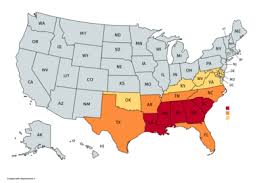Defending the Environment, Deep in the Heart of Dixie
Legal Planet: Environmental Law and Policy 2019-09-23

National environmental groups tend not to devote many resources to the Deep South. State governments and often courts are barren ground for environmental arguments. And.the local activist community is also thin. Law schools are also fewer in number than in the Northeast or Pacific Coasts. So what’s going on in those schools in the environmental area? There are many excellent individual scholars, but are there institutional efforts?
When people talk about the Deep South, they certainly mean to include Mississippi and Alabama. They generally also include Georgia, South Carolina, and Louisiana. There’s room to quibble about boundaries – some would include Texas or Arkansas, others might add the northern edge of Florida. Texas and Florida strike me as very different places and in some ways more akin to border states (or western statees in the case of Texas).The state universities in Texas and Florida have active environmental law programs, as do schools in the Border South like UVA, Vanderbilt, Duke, and UNC. Today, however, I’ll focus on the states in the Deep South. I’ve only looked at some of the best known schools in the area, so my apologies to schools with great programs that I’ve unintentionally omitted.
You might think “Ole Miss” is about the least likely place for an environmental law program. But the University of Mississippi Law School is the home of the National Sea Grant Law Center. Its mission is to “encourage a well-informed constituency by providing legal information and analysis to the Sea Grant Community, policy-makers, and the general public.” The Center has programs on environmental literacy and workplace development , resilient communities, sustainable fisheries, and coastal ecosystems. A related initiative is the Mississippi Alabama Sea Grant Center, which focuses on programs in “coastal communities that lead to the responsible use of ocean and coastal resources in Alabama and Mississippi and the a Gulf of Mexico.” Naturally, Trump wants to a federal funding for the entire Sea Grant program, but he hasn’t succeeded so far.
Emory has an active environmental law clinic and centers on feminism, global health, and other topics, but not the environment. The University of Georgia likewise has a clinic (or “practicum”) but no standalone center. As far as I could tell, it has only one center of any kind, an international law center named for the late Dean Rusk, who was Secretary of State under Kennedy and Johnson. (Unknown to me, it turns out he had a low degree from Berkeley). I’m a bit surprised that Georgia’s environmental law programs are so undeveloped, given that Atlanta is a major city and economic center with the usual range of environmental concerns.
South Carolina also has no environmental law center, while in addition having no environmental law clinic. It does have a Coastal Law Field Lab, which for some reasons isn ‘t currently accepting students.
If we branch out a little to include Arkansas and Louisiana, the University of Arkansas in Fayetteville has some interesting programs dealing with Native Americans, but nothing specifically environmental. It does have a program on food waste, which could be considered at least partly an environmental issue. Louisiana is a different story. Tulane has a Center on Environmental Law, which includes an institute on water resources among other programs. Loyola of New Orleans also has an environmental law center, which focuses on the Gulf Coast. Up in Baton Rouge, LSU has an Energy Law Center, much of which seems oriented toward issues around oil and gas production. The Center does have a Coast and Climate Change Project.
You certainly couldn’t call the Deep South an environmental desert, given the presence of some significant scholars and the scattered centers and clinical programs. But compared to the need for reliable, objective expertise on environmental issues, resources are terribly limited. No doubt this is partly a matter of resources – many of the schools are relatively small, and state budgets aren’t large. A relatively small investment of additional resources in this area of the country could have some real leverage. In general, supporting environmental law centers is a relatively inexpensive way of helping to move the ball on sustainability. If you have a zillion dollars lying around, you might think of throwing some in that direction. Of course, even before doing that, some support for the terrific programs at Berkeley and UCLA wouldn’t be amiss.